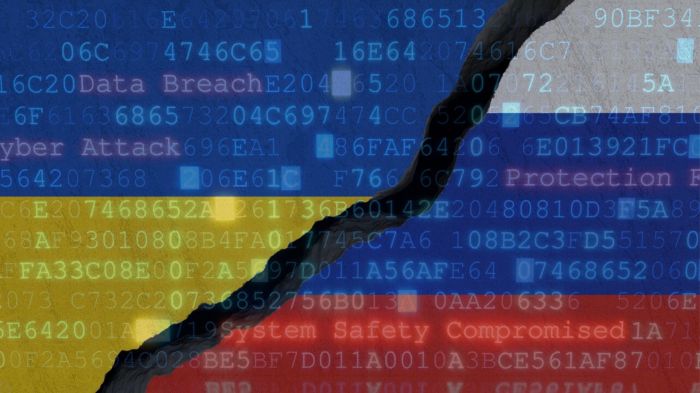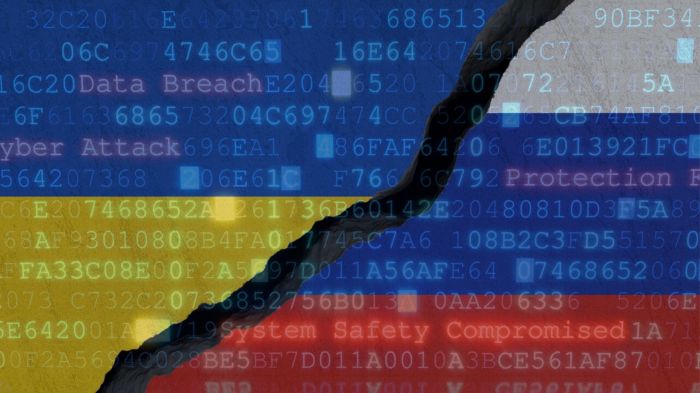Why russia cyber army has struggled to impact ukraine war – Why Russia’s cyber army has struggled to impact the Ukraine war is a question that has captivated experts and observers alike. While Russia has a reputation for formidable cyber capabilities, the conflict has revealed unexpected challenges and limitations in its ability to effectively wage cyber warfare against Ukraine.
The conflict has shown that the nature of cyber warfare has evolved, with both sides deploying innovative tactics and defenses. Ukraine, despite its smaller cyber army, has proven remarkably resilient, thwarting numerous Russian cyberattacks and leveraging cyber tools to bolster its defense and communication efforts.
The Ukrainian government has also effectively used social media and online platforms to counter Russian propaganda and maintain international support.
The Nature of Cyber Warfare in the 21st Century: Why Russia Cyber Army Has Struggled To Impact Ukraine War

Cyber warfare has evolved into a potent force in the 21st century, challenging traditional military strategies and altering the landscape of conflict. The Ukraine conflict has brought to the forefront the critical role of cyber operations in modern warfare, demonstrating their ability to disrupt, damage, and influence the course of conflict.
Cyberattacks in the Ukraine Conflict
The Ukraine conflict has witnessed a wide range of cyberattacks employed by both Russia and Ukraine. These attacks have targeted critical infrastructure, government systems, and civilian networks, highlighting the multifaceted nature of cyber warfare. The following are examples of cyberattacks observed in the conflict:
- Distributed Denial-of-Service (DDoS) Attacks:Both sides have used DDoS attacks to disrupt websites and online services. These attacks overwhelm targeted systems with traffic, rendering them inaccessible. For instance, Russia launched DDoS attacks against Ukrainian government websites in the early stages of the conflict.
- Malware Attacks:Russia has deployed malware, such as NotPetya and Industroyer, to damage critical infrastructure. NotPetya, a ransomware variant, caused widespread disruption to Ukrainian businesses and government agencies. Industroyer, a specialized malware designed to target power grids, was used to disrupt power supply in Ukraine in 2016.
- Data Breaches and Espionage:Cyberattacks have been used to steal sensitive information and conduct espionage operations. Russia has been accused of targeting Ukrainian government agencies and military installations to obtain intelligence.
- Information Warfare:Both sides have engaged in information warfare campaigns using social media and online platforms to spread disinformation and propaganda. These campaigns aim to influence public opinion and sow discord among the opposing population.
Russia’s Cyber Capabilities and Objectives
Russia possesses a sophisticated and well-developed cyber warfare apparatus, which it has employed in various conflicts and geopolitical scenarios. The country’s cyber capabilities have been honed through years of investment and development, enabling it to conduct a wide range of cyber operations.
Key Cyber Units and Organizations
Understanding the organizational structure of Russia’s cyber warfare apparatus is crucial for analyzing its capabilities and objectives. Several key units and organizations within the Russian government and military are responsible for carrying out cyber operations.
Remember to click 6 ways summer job search cool to understand more comprehensive aspects of the 6 ways summer job search cool topic.
- Main Intelligence Directorate (GRU):The GRU is the Russian military intelligence agency, and its cyber warfare arm, known as Unit 26165, is responsible for conducting offensive cyber operations, including espionage, sabotage, and disinformation campaigns. Notable examples include the NotPetya ransomware attack in 2017 and the hacking of the Democratic National Committee during the 2016 US presidential election.
- Federal Security Service (FSB):The FSB is Russia’s domestic intelligence agency, and its cyber unit, known as the “Center for Information Security,” is responsible for defending against cyber threats and conducting offensive cyber operations.
- Federal Agency for Information Technologies (Rostec):Rostec is a state-owned conglomerate responsible for developing and producing military equipment, including cyber weapons.
- Ministry of Defense (MoD):The MoD’s cyber warfare unit, known as the “Main Center for Special Technologies,” is responsible for developing and deploying cyber weapons, conducting offensive cyber operations, and defending against cyber threats.
- Internet Research Agency (IRA):The IRA is a Russian company that has been accused of conducting disinformation campaigns on social media platforms, such as Facebook and Twitter.
Russia’s Stated Cyber Warfare Objectives
While Russia’s cyber capabilities are extensive, its objectives in the context of the Ukraine conflict are multifaceted.
- Disrupt Ukrainian Government and Military Operations:Russia has targeted Ukrainian government and military networks with cyberattacks, aiming to disrupt their communications, command and control, and intelligence gathering. This includes denial-of-service attacks, malware infections, and data breaches.
- Sow Chaos and Confusion:Through disinformation campaigns and propaganda, Russia seeks to sow chaos and confusion among the Ukrainian population and international community. This involves spreading false information, manipulating public opinion, and undermining trust in Ukrainian institutions.
- Intimidate and Deter Ukraine and its Allies:By demonstrating its cyber capabilities, Russia aims to intimidate Ukraine and its allies, deterring them from supporting Ukrainian resistance or taking actions that could be seen as hostile to Russia.
- Support Russian Military Operations:Cyber operations can play a crucial role in supporting Russian military operations by providing intelligence, disrupting enemy communications, and facilitating the deployment of troops and equipment.
Historical Track Record of Russian Cyber Operations
Russia has a long history of conducting cyber operations, dating back to the early 2000s. The country’s cyber capabilities have evolved significantly over time, becoming increasingly sophisticated and targeted.
- Estonia (2007):In 2007, Russia launched a series of cyberattacks against Estonia, targeting government websites, banks, and media outlets. The attacks were widely attributed to Russia, and they demonstrated its ability to disrupt critical infrastructure and sow chaos.
- Georgia (2008):During the 2008 Russo-Georgian War, Russia launched cyberattacks against Georgian government websites, media outlets, and banks. The attacks were coordinated with military operations and aimed to disrupt Georgian communications and command and control.
- Ukraine (2014):In 2014, Russia annexed Crimea and supported separatists in eastern Ukraine. This was accompanied by a wave of cyberattacks targeting Ukrainian government websites, military infrastructure, and critical infrastructure.
- United States (2016):In 2016, Russia interfered in the US presidential election by hacking into the Democratic National Committee’s servers and releasing stolen emails. The operation was aimed at influencing the election outcome and sowing discord in American society.
- NotPetya (2017):In 2017, Russia launched the NotPetya ransomware attack, which caused widespread disruption to businesses and organizations worldwide. The attack was believed to be a deliberate act of cyber warfare, targeting Ukraine and its allies.
Challenges Faced by the Russian Cyber Army
Despite its considerable cyber capabilities, the Russian cyber army has encountered numerous challenges in its attempts to influence the Ukrainian war. These challenges have significantly hindered its effectiveness and prevented it from achieving its desired objectives.
Technical Challenges, Why russia cyber army has struggled to impact ukraine war
Technical challenges have played a significant role in limiting the effectiveness of Russian cyberattacks. The complexity of modern cyber infrastructure and the sophistication of Ukrainian defenses have presented significant obstacles.
- Network Complexity:The interconnected nature of modern networks, including the internet and critical infrastructure, makes it difficult to target specific systems without collateral damage. This complexity can lead to unintended consequences and escalate the conflict, which is a risk Russia has been unwilling to take.
- Sophisticated Defenses:Ukraine has invested heavily in its cyber defenses, bolstering its security infrastructure and improving its ability to detect and respond to attacks. This has significantly increased the difficulty of launching successful attacks. For example, Ukraine has been able to successfully identify and mitigate a large number of Russian cyberattacks.
- Cyber Hygiene:Ukraine has focused on improving its cyber hygiene by training its workforce, patching vulnerabilities, and implementing robust security protocols. This has made it more difficult for Russian attackers to exploit vulnerabilities in Ukrainian systems.
Impact of International Sanctions and Cyber Defenses
International sanctions and cyber defenses have significantly hampered the Russian cyber army’s ability to operate effectively. These measures have restricted access to critical resources and technologies, limiting its capabilities.
- Sanctions on Technology:Western sanctions have targeted key Russian technology companies, restricting their access to critical hardware and software components. This has limited the Russian cyber army’s ability to develop and deploy new cyber weapons and tools.
- Disruption of Infrastructure:Sanctions have also targeted Russia’s financial and telecommunications infrastructure, making it difficult for Russian cyber operators to communicate and coordinate their attacks. This disruption has significantly hindered the Russian cyber army’s ability to launch coordinated and effective operations.
- International Cooperation:International cooperation in cybersecurity has been instrumental in countering Russian cyberattacks. Sharing threat intelligence and coordinating defensive measures has enabled countries to identify and mitigate Russian cyber threats more effectively. This collaboration has significantly reduced the effectiveness of Russian cyber operations.
Examples of Ukrainian Cyber Defenses Thwarting Russian Cyberattacks
Ukraine has successfully defended against numerous Russian cyberattacks, demonstrating its resilience and effectiveness. These examples highlight the challenges faced by the Russian cyber army and the effectiveness of Ukrainian defenses.
- Disruption of Russian Propaganda:Ukrainian cyber defenders have effectively disrupted Russian propaganda efforts by taking down websites and social media accounts spreading disinformation. This has limited the effectiveness of Russian information warfare.
- Defense of Critical Infrastructure:Ukrainian authorities have successfully defended against Russian cyberattacks targeting critical infrastructure, such as power grids and communication networks. This has ensured the continued operation of essential services despite the ongoing conflict.
- Cyberwarfare Tactics:Ukraine has employed innovative cyberwarfare tactics, such as using botnets to disrupt Russian operations and conducting denial-of-service attacks against Russian websites. These tactics have proven effective in hindering Russian cyber capabilities.
Ukraine’s Cyber Resilience and Defense
Ukraine’s successful defense against Russian cyberattacks has been a crucial factor in the country’s overall resilience during the war. This success can be attributed to a combination of proactive measures, strategic partnerships, and a robust national cyber defense infrastructure.
Ukraine’s Cyber Defense Strategies and Tactics
Ukraine has implemented a multi-layered approach to cyber defense, encompassing both offensive and defensive strategies. This approach has proven effective in disrupting Russian cyber operations and protecting critical infrastructure.
- Proactive Defense:Ukraine has taken steps to harden its critical infrastructure and systems against cyberattacks. This includes implementing robust security measures, conducting regular vulnerability assessments, and deploying advanced threat detection and response systems.
- Cyber Deception:Ukraine has employed cyber deception tactics to mislead and confuse Russian attackers. This involves creating fake targets and spreading disinformation to divert Russian cyber operations away from critical assets.
- Cyber Offensives:Ukraine has launched counter-cyberattacks against Russian infrastructure and networks, disrupting their ability to conduct cyber operations against Ukraine. These offensive operations have targeted Russian command and control systems, propaganda networks, and critical infrastructure.
- International Cooperation:Ukraine has forged strong partnerships with international allies to enhance its cyber defense capabilities. This includes sharing threat intelligence, providing technical assistance, and deploying cyber security experts to Ukraine.
The Role of International Partners in Ukraine’s Cyber Defense
Ukraine’s international partners have played a critical role in bolstering the country’s cyber defense capabilities. These partnerships have provided Ukraine with access to advanced technologies, expertise, and intelligence sharing, enhancing its ability to withstand Russian cyberattacks.
- NATO:NATO member states have provided Ukraine with technical assistance, intelligence sharing, and training in cyber defense. The alliance has also deployed cyber security experts to Ukraine to assist with the country’s defense efforts.
- The United States:The US has been a key partner in Ukraine’s cyber defense, providing significant technical assistance, intelligence sharing, and training. The US has also imposed sanctions on Russian individuals and entities involved in cyberattacks against Ukraine.
- European Union:The EU has provided Ukraine with financial and technical assistance to enhance its cyber defense capabilities. The EU has also imposed sanctions on Russia and Belarus in response to their cyberattacks against Ukraine.
Impact of Ukraine’s Cyber Resilience on the Overall Conflict
Ukraine’s cyber resilience has had a significant impact on the overall conflict, enabling the country to maintain essential services, communicate effectively, and coordinate military operations. The successful defense against Russian cyberattacks has also demonstrated the importance of a robust cyber defense posture in modern warfare.
- Maintaining Critical Infrastructure:Ukraine’s cyber defense efforts have been crucial in protecting its critical infrastructure, including power grids, transportation systems, and communication networks. This has ensured the continued functioning of essential services, supporting the country’s overall resilience.
- Disrupting Russian Cyber Operations:Ukraine’s counter-cyberattacks have disrupted Russian cyber operations, hindering their ability to effectively target Ukrainian infrastructure and networks. This has limited the impact of Russian cyber warfare efforts on the conflict.
- Enhancing Communication and Coordination:Ukraine’s cyber defense has enabled the country to maintain secure communication channels, facilitating the coordination of military operations and the dissemination of information to the public.
The Impact of Cyber Operations on the Ukraine War
The impact of cyber operations on the Ukraine war has been significant, although not as decisive as some initially predicted. While Russia has launched a barrage of cyberattacks, their effectiveness has been limited by Ukraine’s strong defenses and the limitations of cyberwarfare itself.
The Limited Impact of Cyberattacks on Military Operations
The extent to which cyber operations have directly affected the course of the conflict has been relatively limited. While there have been reports of cyberattacks targeting Ukrainian infrastructure and military systems, these have not significantly disrupted Ukrainian military operations or caused widespread damage.
- Disruption of Communications and Infrastructure:Russian cyberattacks have targeted Ukrainian communication networks, power grids, and transportation systems. While some disruption has occurred, these attacks have not been successful in crippling Ukrainian infrastructure or hindering military operations on a large scale.
- Targeting Military Systems:Some reports suggest that Russia has attempted to disrupt Ukrainian military communications and control systems, but the effectiveness of these attacks remains unclear. These attacks have not been decisive in hindering Ukrainian military operations.
- Cyber Espionage and Information Gathering:Russia has undoubtedly used cyber tools for espionage and information gathering, but the extent to which this has influenced the conflict’s trajectory is difficult to assess. This type of cyber activity is often covert and its impact is hard to measure.
The Role of Cyberattacks in Shaping Public Opinion and International Perceptions
Cyberattacks have played a significant role in shaping public opinion and international perceptions of the war. Russia’s cyber operations have been widely condemned by the international community, further isolating Russia and strengthening support for Ukraine.
- Dissemination of Propaganda and Disinformation:Russia has employed cyber operations to spread propaganda and disinformation, aiming to undermine Ukrainian morale, sow discord among Western allies, and justify its invasion. These efforts have been met with counter-narratives and fact-checking initiatives, but their impact on public opinion cannot be underestimated.
- Cyberattacks on Media Outlets:Russian cyberattacks have targeted Ukrainian and international media outlets, attempting to disrupt their operations and control the flow of information. These attacks have highlighted the vulnerability of media infrastructure and the importance of cybersecurity in ensuring a free and independent press.
- International Condemnation and Increased Support for Ukraine:Russia’s cyber operations have been widely condemned by the international community, with many countries accusing Russia of violating international norms and engaging in cyberwarfare. This condemnation has further isolated Russia and strengthened support for Ukraine, both in terms of military aid and humanitarian assistance.
Long-Term Implications of Cyber Warfare for the Ukraine Conflict and Future Conflicts
The Ukraine war has highlighted the growing importance of cyberwarfare in modern conflicts. The conflict has provided a real-world case study of the potential capabilities and limitations of cyber operations, shaping the future of warfare and cybersecurity.
- Increased Focus on Cyber Defense:The Ukraine conflict has underscored the need for robust cyber defenses to protect critical infrastructure and military systems from attack. Countries are likely to invest heavily in strengthening their cyber capabilities and developing new strategies to counter cyber threats.
- Evolution of Cyber Warfare Tactics:The Ukraine war has witnessed the use of new and evolving cyberwarfare tactics, such as the deployment of ransomware and the use of social media platforms for propaganda and disinformation. This has highlighted the need for constant adaptation and innovation in the field of cyber defense.
- The Blurring of Lines Between War and Peace:The use of cyber operations in the Ukraine conflict has blurred the lines between war and peace, raising questions about the legality and ethics of cyberattacks in a non-kinetic conflict. This has sparked debates about the need for international norms and regulations to govern cyber warfare.





